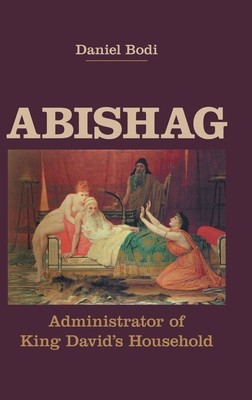
- We will send in 10–14 business days.
- Author: Daniel Bodi
- Publisher: Sheffield Phoenix Press Ltd
- ISBN-10: 1910928879
- ISBN-13: 9781910928875
- Format: 15.6 x 23.4 x 2.4 cm, kieti viršeliai
- Language: English, Vokiečių
- SAVE -10% with code: EXTRA
Reviews
Description
Following Daniel Bodi's previous monographs on the three wives of King David-Michal, Bathsheba and Abigail-here is a fourth one on Abishag, the last woman in his life. It has not been recognized before how decisive a role she played as a palace administrator in David's final political crisis, Adonijah's coup d'état, and Solomon's proclamation as king.
Hitherto, Abishag has been given androcentric readings. Her position as administrator has been demoted to that of a mere housekeeper, bedfellow or even hot-water bottle. Some rabbinic authors transformed her into an androgynous being, claiming an intersex person warms better than a young female virgin. In fact, the term for Abishag's office as sōkenet is nothing but the feminine form of sōken 'palace steward', a well-known functionary across the Semitic world. Much more than a simple housekeeper, Abishag wields administrative power with a legal role as a witness in Solomon's appointment.
Exploring further the role of women at royal courts, Bodi also offers a comparative analysis of the famous queens who played a role in the royal succession as kings' mothers in Egypt, Mari, Hatti, Ugarit and Assyria. Solomon's appointment as David's successor results from a palace putsch, executed with cunning and craftiness, which are to be understood as archaic forms of wisdom in the Hebrew Bible, classical Greece and the ancient Near East.
The stories of David's wives-and of Abishag-together form a Hebrew document in the style of an Advice to a Prince. An interesting comparison is drawn between David's four wives and the four females Odysseus encounters in Homer's Odyssey: Circe, Calypso, Nausicaa and Penelope. Strikingly, the Hebrew version of the Advice to a Prince and the Homeric Epic were being written at roughly the same time, the end of the eighth century bce.
EXTRA 10 % discount with code: EXTRA
The promotion ends in 22d.16:20:21
The discount code is valid when purchasing from 10 €. Discounts do not stack.
- Author: Daniel Bodi
- Publisher: Sheffield Phoenix Press Ltd
- ISBN-10: 1910928879
- ISBN-13: 9781910928875
- Format: 15.6 x 23.4 x 2.4 cm, kieti viršeliai
- Language: English, Vokiečių English, Vokiečių
Following Daniel Bodi's previous monographs on the three wives of King David-Michal, Bathsheba and Abigail-here is a fourth one on Abishag, the last woman in his life. It has not been recognized before how decisive a role she played as a palace administrator in David's final political crisis, Adonijah's coup d'état, and Solomon's proclamation as king.
Hitherto, Abishag has been given androcentric readings. Her position as administrator has been demoted to that of a mere housekeeper, bedfellow or even hot-water bottle. Some rabbinic authors transformed her into an androgynous being, claiming an intersex person warms better than a young female virgin. In fact, the term for Abishag's office as sōkenet is nothing but the feminine form of sōken 'palace steward', a well-known functionary across the Semitic world. Much more than a simple housekeeper, Abishag wields administrative power with a legal role as a witness in Solomon's appointment.
Exploring further the role of women at royal courts, Bodi also offers a comparative analysis of the famous queens who played a role in the royal succession as kings' mothers in Egypt, Mari, Hatti, Ugarit and Assyria. Solomon's appointment as David's successor results from a palace putsch, executed with cunning and craftiness, which are to be understood as archaic forms of wisdom in the Hebrew Bible, classical Greece and the ancient Near East.
The stories of David's wives-and of Abishag-together form a Hebrew document in the style of an Advice to a Prince. An interesting comparison is drawn between David's four wives and the four females Odysseus encounters in Homer's Odyssey: Circe, Calypso, Nausicaa and Penelope. Strikingly, the Hebrew version of the Advice to a Prince and the Homeric Epic were being written at roughly the same time, the end of the eighth century bce.


Reviews